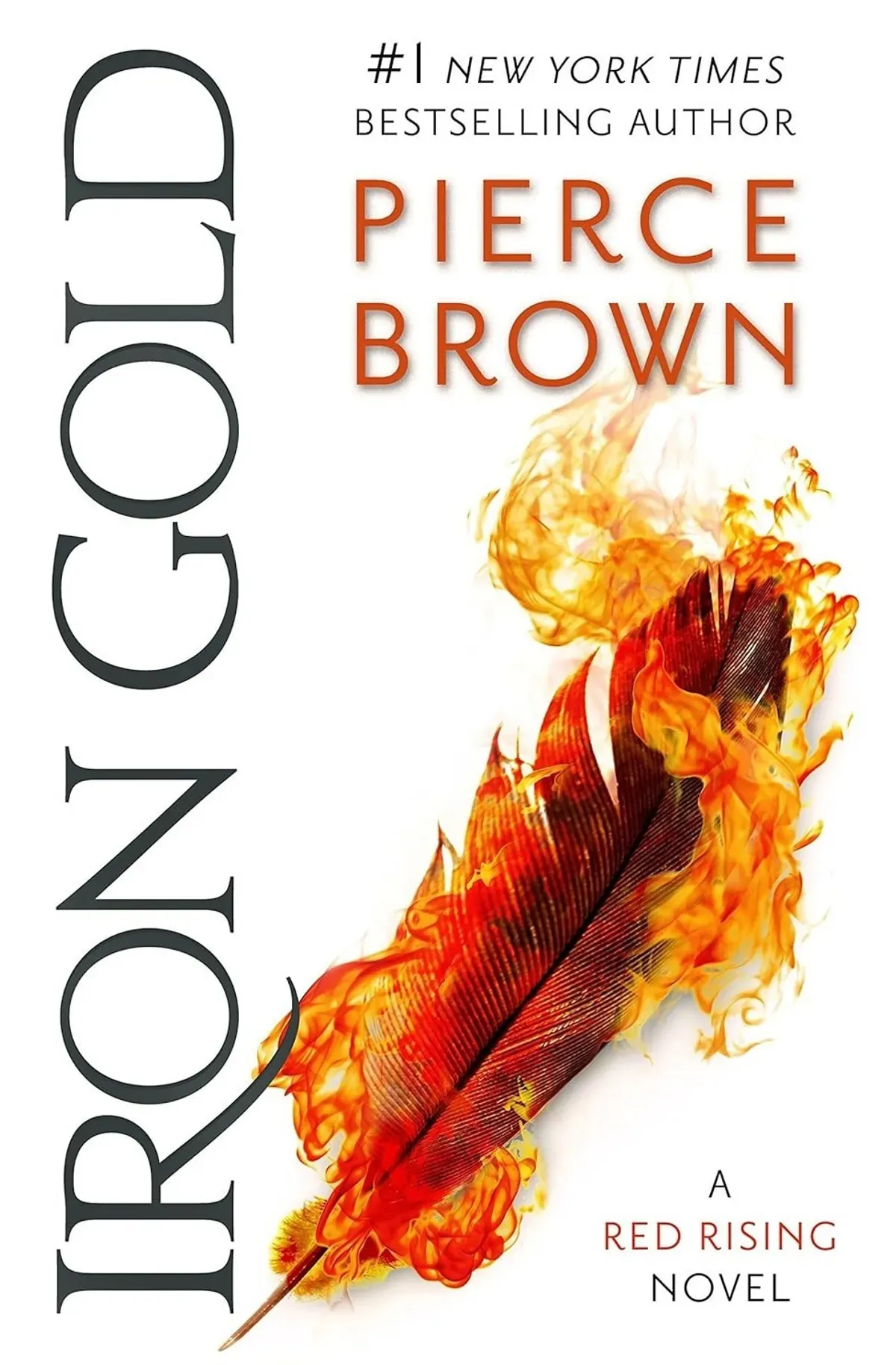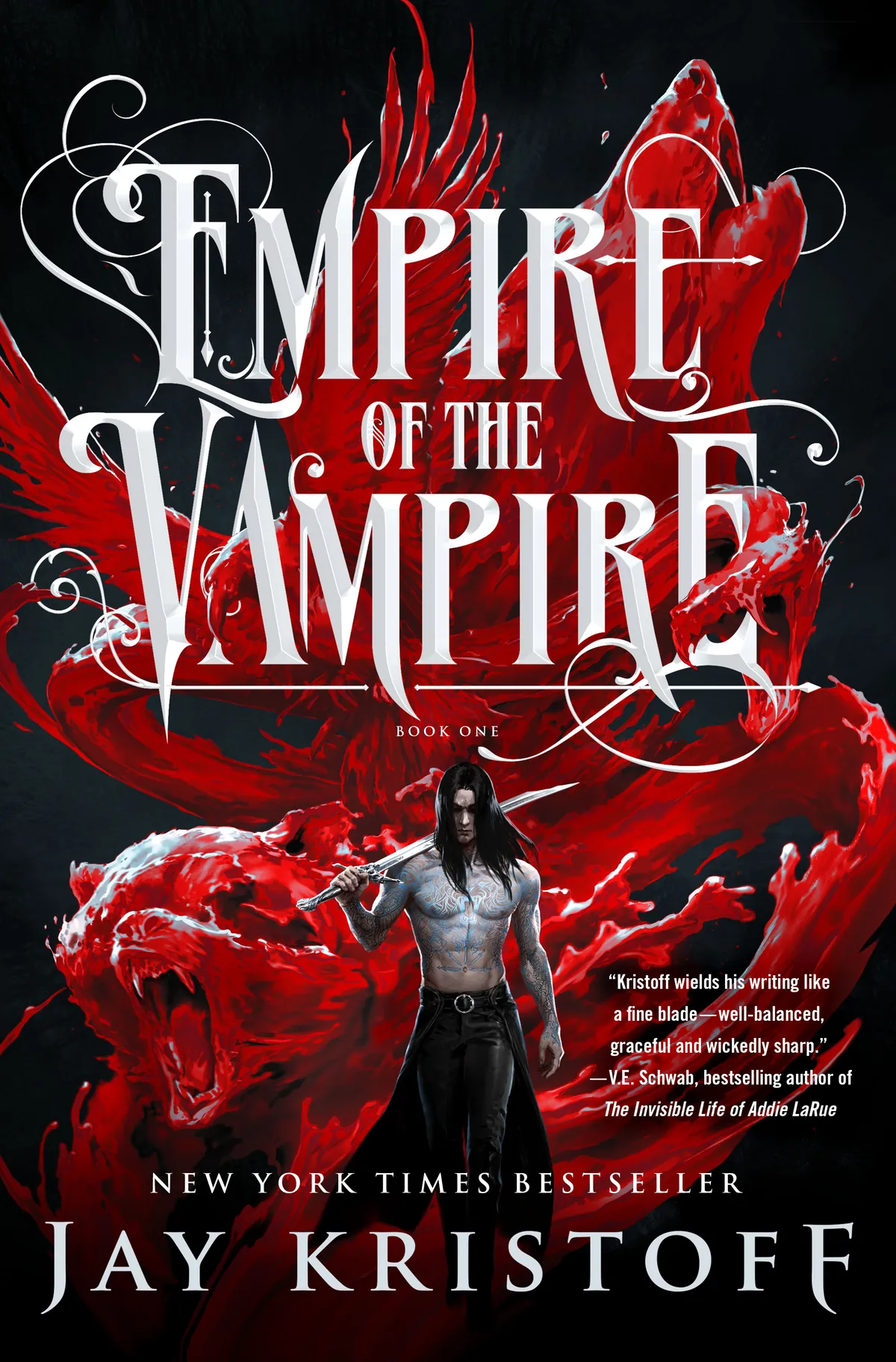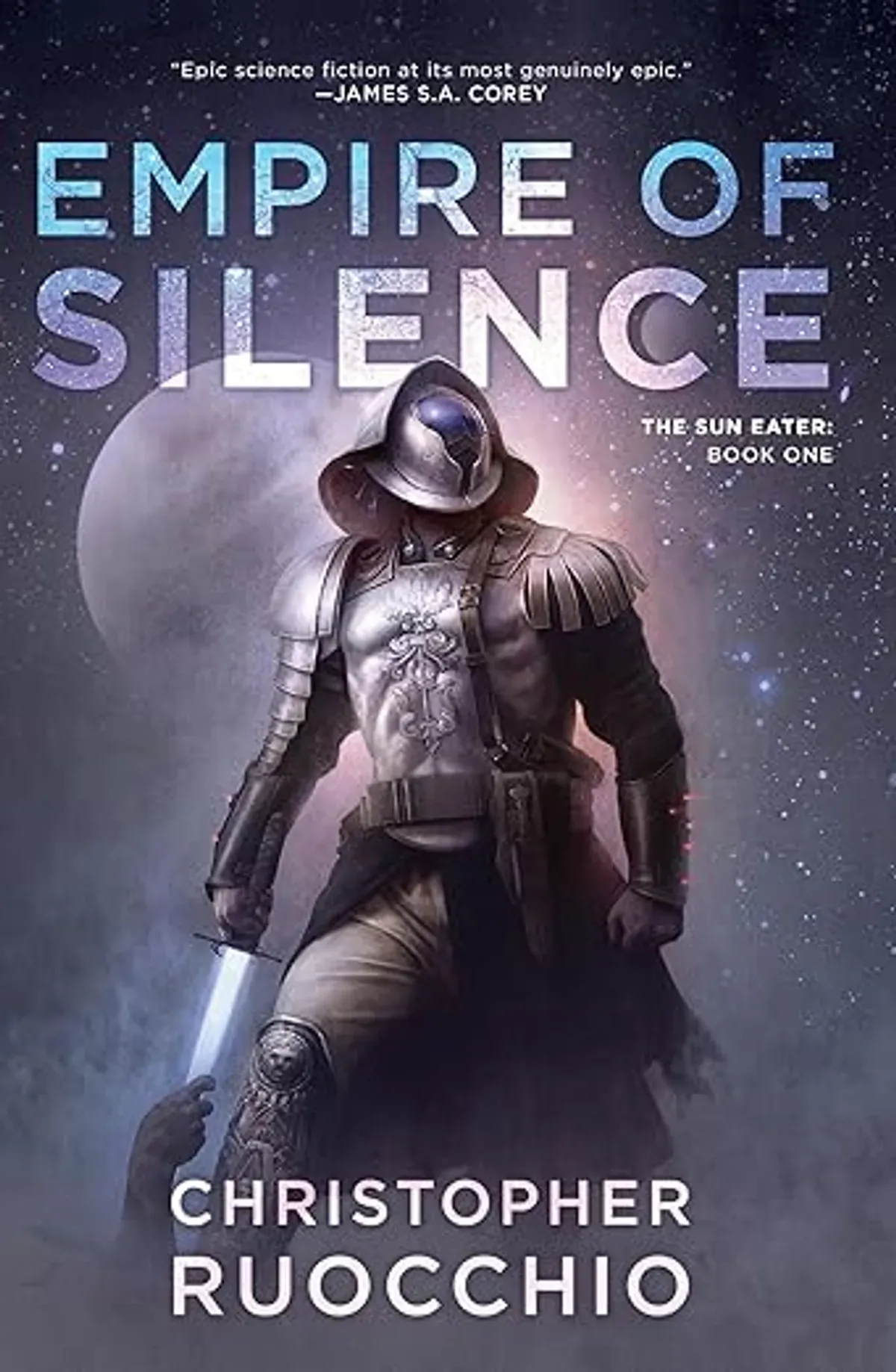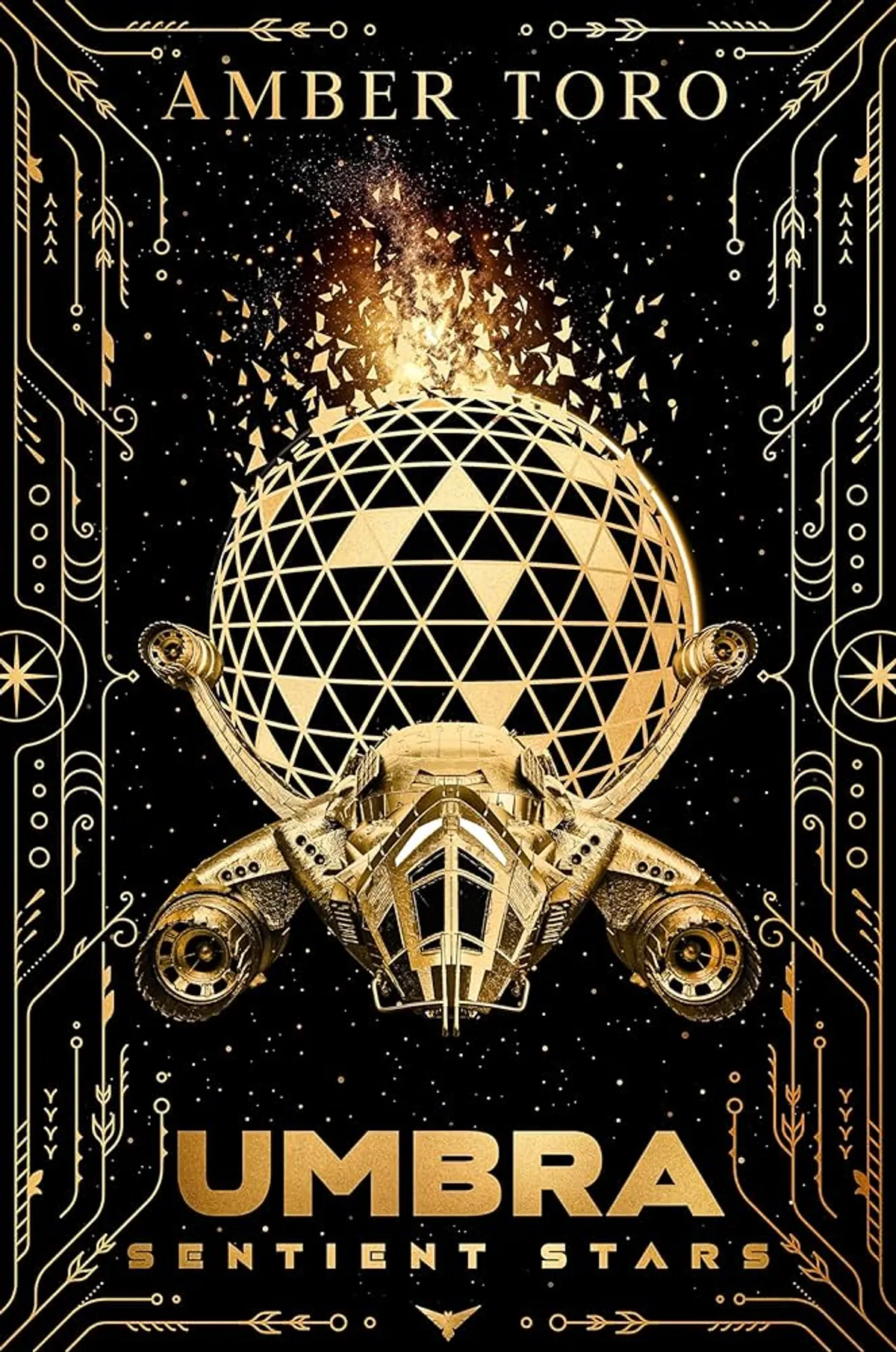Iron Gold
by Pierce Brown
Reviewed by Devin Ford on April 11, 2025
Est. Reading Time: 14 min

Quick Info
Title: Iron Gold
Author: Pierce Brown
Series: Red Rising Saga (Book 4)
Published: January 16, 2018
ISBN-13: 9780425285930
At a Glance: Revolution’s Painful Aftermath
The revolution which brought freedom in the aftermath of the Morning Star events fails to bring peace as Iron Gold ends ten years later. Darrow continues his battle against remaining Gold loyalists while the Republic struggles with internal factional divisions since he turned thirty and became a father to Mustang’s son. Darrow risks everything he built by launching an unauthorized attack against Republic orders during his desperate gamble.
The ordinary citizen perspective is represented by young Red miner Lyria of Lagalos who learns the harsh reality that freedom brought no real improvement to Red lives when a tragedy strikes her refugee camp. The narrative of her escape from the mines to the urban areas of Mars stands out as one of the most understandable and emotionally powerful journeys which presents the real costs of revolution from individuals outside political influence.
The emotionally burdened ex-soldier Ephraim who now operates as a top-tier thief reluctantly takes on a risky mission that links him to powerful revolutionary figures. Lysander au Lune observes the shattered Solar System from his exile with Cassius as his mentor while creating his vision for humanity’s future. The four interwoven stories illustrate how revolutionary aftermaths combine idealistic visions with pragmatic needs which require addressing problems from both the previous regime and its replacement.
Society in Transition: The Price of Freedom
The newest installment of Pierce Brown’s series expands his fictional universe by tracking the challenging transition from a successful revolution to establishing competent leadership. The fourth installment moves past the destruction of the racial hierarchy to explore how to rebuild a new system from its remains. The Republic battles intricate problems regarding equality, justice and security while Brown elaborates on a political system where Mustang serves as Sovereign and Dancer acts as Senate head.
A multi-perspective worldbuilding approach skillfully reveals the Republic’s internal contradictions by presenting different social perspectives. Darrow’s military perspective unveils how endless battles with Gold resistance influence government tactics and Lyria’s narrative exposes the stark mismatch between the Republic’s promises and the actual conditions faced by common people. The experiences she faced within Martian refugee camps followed by her time in Hyperion City reveal the direct impact of the revolution on those whom it promised to free yet failed to protect.
Throughout the Solar System Brown establishes distinctive locations which reflect the fragmented distribution of political authority. Mars shows stark contrasts between developing cities and declining mining communities; Mercury stands as a violent battlefield for ongoing conflict; Luna serves as the political center for the Republic facing internal pressures; while the Rim territories maintain their Gold traditions while observing Core changes with caution. Each location exhibits its own cultural characteristics and poses its own distinct difficulties instead of serving as an interchangeable background.
The series progresses its technology by integrating familiar tools like razors and gravBoots with innovative components developed throughout ten years of advancement. Financial resources combined with personal networks determine access to technology between Colors even though caste-based restrictions no longer apply but obstacles remain which Lyria faces while living in a formally equal society that fails to deliver equal opportunity.
The novel presents an authentic depiction of life following the revolution by focusing on the resulting feelings of disillusionment after liberation. Brown dismisses the simplistic notions that freedom from oppression leads to immediate utopia while simultaneously refuting the idea that change is impossible. The story successfully engages readers from different political backgrounds because it shows a society facing real difficulties as its idealistic visions clash with practical challenges during times of transition.
Multiple Protagonists: Four Perspectives on a Fractured World
The narrative of Iron Gold diverges significantly from the original trilogy with its introduction of three new characters who offer different perspectives on society beyond Darrow’s viewpoint. The story moves beyond Darrow’s personal revolution to examine societal transformation through multiple perspectives which attracts a broader audience.
Throughout the story Darrow evolves into a multifaceted character who transforms from youthful idealism into battle-hardened experience. The combination of ten years of leadership experience mixed with continuous warfare has solidified his personality traits which enhanced his skills while making him more ruthless. His relationship with Pax reveals Darrow’s newly developed vulnerabilities while making him reconsider the future he envisions for generations to come. The revolutionary methods employed by Darrow conflict with the Republic’s administrative expectations leading to genuine character disputes.
Lyria emerges as one of the novel’s most compelling and relatable characters, providing a crucial perspective often missing from revolutionary narratives: The story powerfully depicts the typical person who finds themselves trapped by unstoppable historical developments. Her chapters excel in emotional truth and accessibility allowing readers from diverse backgrounds to relate to her quest for self-identity amid global changes while preserving her dignity. The tragedy in her family at the camp brings about a powerful visceral reaction of rage and disillusionment. Throughout her journey she faces both exploitation and acts of unexpected kindness which propels her transformation from a bitter victim into a determined survivor while forming a gratifying character arc that reaches its peak when she develops an unexpected bond with Victra’s household staff.
The character Ephraim exposes the inner workings of crime while showing the personal consequences of revolution. His partner’s death in military combat forms a powerful backstory that explains his cynical outlook but does not excuse his actions. He tries to avoid political matters but ends up caught in revolutionary intrigue through an unwilling kidnapping scheme tied to key revolutionaries.
Lysander’s critique of the Republic carries significant weight because he once belonged to the upper echelons of society. His upbringing in a Gold value system together with the range of ideologies he encountered during his exile provides him with a unique perspective for evaluating both systems. He maintains allegiance to his cultural roots while recognizing its flaws which produces a character with ethical complexity whose choices hold significant weight.
The supporting characters build upon the story world through their connections with the four central figures. The return of Sevro, Victra and Mustang demonstrates how their life courses have split away from Darrow’s journey since their time in the original trilogy. The narrative world gains fresh dimensions with the arrival of colorful characters like Apollonius. Every reader will find meaningful content throughout the novel as it presents perspectives through characters from diverse genders, classes, and backgrounds.
Four Paths Converging: Plot Structure and Pacing
The narrative architecture of Iron Gold surpasses previous books in complexity because it explores four separate storylines that reveal their interconnectedness. The narrative approach builds more slowly than the original trilogy’s clear storylines which demands patience from readers who understand Darrow’s perspective.
The pacing of the story demonstrates strengths and weaknesses in the new narrative framework. The first segments establish backstory for main characters to highlight their distinct life situations and incentives which constructs narrative groundwork even though they sometimes seem unrelated to the primary storyline. Narrative speed picks up when character storylines converge at the midpoint to demonstrate how their lives intersect.
Lyria experiences a pivotal moment in her storyline when she finds out that the helpful elderly man she trusts turns out to be Ephraim who manipulates her for his own plan. The moment of realization creates new paths for both characters while demonstrating Brown’s talent for merging separate narrative elements. Different narrators performing each character’s voice in the audiobook brings the multi-POV structure to life while providing an appreciated feature for listeners who may struggle with shifting perspectives.
Throughout the book Brown maintains equilibrium between various conflicts across its four separate storylines. Darrow leads numerous military operations as Lyria deals with social and economic problems while Ephraim executes complex heists and Lysander addresses political and philosophical concerns. The varied storytelling method reveals multiple aspects of the world while maintaining reader interest across different story preferences.
The story’s narrative construction demonstrates how the post-revolutionary world has multiple dimensions which require diverse perspectives for complete understanding. Readers succeed in understanding the divided narrative structure through connections they find between isolated incidents and overarching political control and social evolution patterns.
The ending of the novel simultaneously resolves existing issues and sets up future storylines. The protagonists journey toward Solar System conflicts that define the future experience significant results from their decisions. Instead of being artificially added to the narrative, suspense develops naturally from character choices which generates widespread audience interest in continuing the saga.
Between the Sheets: Revolution Before Romance
BroMantasy Spice Rating
Barely There
(Chaste Romance)
Iron Gold maintains the series’ tradition of minimal romance content through a spice level rating of 🌶️ (1.0). The story uses established relationships to develop characters instead of focusing on romantic development. The marital relationship between Darrow and Mustang demonstrates the tension created by their distinct duties and the personal sacrifices they make which become evident through their rare encounters.
The story presents its romance as authentic because it stems naturally from the characters’ personalities and their real-life situations. Within stories of political turmoil and social change characters focus on survival which makes their occasional emotional relationships seem particularly meaningful. Readers of all kinds find the relationships in Lyria’s short-lived connections with others appealing because they highlight human bonds created through adversity instead of romantic ties.
By emphasizing genuine emotional connections rather than extensive romantic subplots the narrative appeals to a wide range of readers. Through shared challenges and mutual goals characters establish genuine emotional connections which enhances the narrative tone and themes.
Bro Reading Comfort: Politics and Warfare Over Romance
It is perfectly acceptable to read Iron Gold in public because it only receives a 😳 (1.0) rating. The book cover maintains series consistency through abstract symbols but excludes romantic themes while its narrative focuses on political strategies and combat scenes that foster character development instead of romantic plots.
The novel belongs to the military science fiction and political thriller genres which traditionally attract male readers yet its range of character perspectives including Lyria’s development adds deep emotional layers that move its attraction beyond standard genre limits. The book portrays emotional scenes that emerge naturally from characters’ experiences instead of being artificially placed to add romance.
The pattern continues because readers mainly feel discomfort when exposed to violent scenes rather than romantic elements. Brown creates believable military narratives that align with adult science fiction genre expectations while remaining engaging for readers who value character development alongside military operations.
Darkness Factor: The Cost of Idealism
The story gets a darkness score of 💀💀💀💀 (4.0) because it explores the consequences of revolution and the essential moral compromises needed to sustain societal change. Darrow’s military operation results in catastrophic civilian losses which establishes the foundation for examining ethical dilemmas within warfare.
The start of darkness begins with physical violence which extends to cause psychological turmoil and evoke philosophical questions. Each protagonist faces moral compromises that challenge their core beliefs: Darrow must reconcile his revolutionary ideals with the oppressive methods he now employs while Lyria faces the harsh truth that the revolution she supported has failed to fulfill its promises to her family and community.
Brown employs dark elements to enrich the theme of the work rather than relying on shock value. The story employs violent imagery alongside moral dilemmas to examine if genuine social change can take place without establishing the same oppressive systems it aims to eliminate. Characters reveal their core values through their responses to dark situations which results in meaningful character development rather than simply advancing the story.
The narrative captivates readers as it examines failed idealism through characters who confront the destructive consequences of their well-meaning actions. This narrative’s complex moral framework goes beyond traditional hero versus villain structures through an examination of how power corrupts even those with good intentions thereby creating meaningful commentary that connects with readers across political boundaries.
Book Battlefield: A New Direction for the Saga
The latest installment Iron Gold moves the series to a bold new direction by finishing its revolution story to explore the difficulties associated with governance and rebuilding society. The fourth book departs from the straightforward opposition narratives found in the first three books by introducing complex moral questions that lead readers to reevaluate their previous support for historical uprisings.
While many extended series drift after their original trilogies end, Iron Gold preserves its momentum through expanded thematic exploration rather than extending old conflicts. Brown develops authentic new directions which seem like natural extensions of his established world as opposed to allowing series quality to deteriorate when they extend past their natural conclusions.
The multiple-POV structure aligns Brown’s story with expansive science fiction and fantasy stories like The Expanse and A Song of Ice and Fire. Within his existing universe Brown applies this perspective technique to reveal multiple complementary elements of his complex society rather than expanding with additional storylines. The narrative method enables both veteran readers and new audiences to engage with the story through specific character viewpoints with Lyria’s chapters functioning as a welcoming introduction to the series.
Brown demonstrates his growth as an author in Iron Gold by tackling morally ambiguous subjects and complex political issues with greater depth. The author manages to show his writing has gained sophistication while maintaining the original series’ intense atmosphere through a perfect blend of intriguing concepts and thrilling plot developments that attract different types of readers.
Should You Bother?
For Fans of the Original Trilogy: The book Iron Gold presents a meaningful extension of its predecessor while maintaining respect for the original work and delving into fresh directions. The narrative shifts focus from triumphant revolution by scrutinizing its difficult aftermath which reveals deeper layers of complexity in the original story.
For Political Science Fiction Readers: The book presents an advanced political analysis of post-revolution events that stands out as unique within its literary category. The narrative presents a layered depiction of societal change through multiple viewpoints which recognizes both visionary aspirations and real-world obstacles while maintaining political neutrality.
For Character-Driven Readers: Shifting to four protagonists allows for richer character development beyond what the original trilogy achieved with its single-focus approach. The narrative gains depth from the range of personalities and ethical views presented by each viewpoint character and Lyria’s particular story delivers an emotionally engaging experience for readers interested more in character-driven plots than large-scale political drama.
For Audiobook Enthusiasts: A variety of narrators for each point of view generates a richer audio experience through distinct character voices and acting techniques which makes this book highly suitable for audio listeners who are transitioning from single to multiple character perspectives.
Final BroMantasy Verdict
Brown turns the potential trilogy conclusion into the first installment of a broader series through Iron Gold. Brown achieves natural narrative progression by exploring the chaotic aftermath of revolution instead of adding unnecessary external conflicts.
This work achieves its 4.0 rating by ambitiously expanding both perspective and themes but faces difficulties maintaining pacing through its multiple storylines. The early chapters’ gradual buildup and scattered narrative eventually develops into an engaging convergence that validates the complex structure but presents a challenging shift for those who read the original trilogy’s simpler stories.
Iron Gold contains elements to engage readers belonging to various demographic groups. Readers who enjoy action-packed scenes will find military operations and heist sequences thrilling; those who focus on political themes will engage with the complex questions of governance and justice; while those who prefer character development will connect with personal journeys especially Lyria’s transformation from bitter victim to determined survivor which provides one of the most accessible and emotionally authentic storylines in the book.
Iron Gold delivers complete narrative enjoyment on its own while setting up an exciting continuation for its series. The cliffhanger elements generate authentic anticipation for future developments and deliver enough resolution to resolve this volume’s immediate conflicts.
The book stands out because it enriches the victorious revolutionary story from the original trilogy while preserving its foundational elements. Brown develops a sophisticated exploration of social transformation through his depiction of the persistent difficulties that successful revolutions encounter when constructing improved systems, which honors readers’ intelligence with compelling action and character dynamics that maintain series popularity across different audience demographics.
You Might Also Enjoy
Frequently Asked Questions
Is this book part of a series?
Yes, this is book 4 in the Red Rising Saga series.
How spicy is the romance?
We rate the spice level at 🌶️ (1/5). Minimal romantic content in a narrative focused on the painful realities of revolution's aftermath
How uncomfortable is it to read in public?
We rate the public reading discomfort level at 😳 (1/5). Engaging content with few concerns for public reading beyond its depictions of violence
How dark are the themes in this book?
We rate the darkness level at 💀💀💀💀 (4/5). Unflinching exploration of failed idealism, desperate choices, and the harsh realities of building a new society
What age group is this book for?
This book is generally recommended for adult readers due to its mature themes. We recommend checking specific content warnings if you are sensitive to certain topics.





